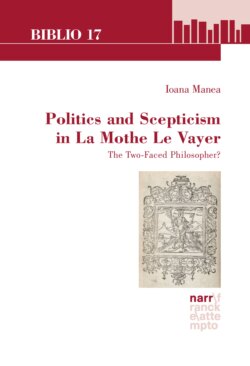Politics and Scepticism in La Mothe Le Vayer

Реклама. ООО «ЛитРес», ИНН: 7719571260.
Оглавление
Ioana Manea. Politics and Scepticism in La Mothe Le Vayer
Inhalt
Introduction
Chapter 1. The Philosopher La Mothe Le Vayer: Incurable Sceptic. 1.1 The Philosopher La Mothe Le Vayer: Philosopher with an Insatiable Appetite for Books
1.2 Supporter of Curiosity that Leads to Admiration
1.3 Adversary of Curiosity for the Causes behind the Show Offered by the World
1.4 Fervent Admirer of Sextus Empiricus’ “Decalogue”
1.5 The Contradictions: Instrument against Stubbornness
1.6 The Sceptic who Merges Pyrrhonism with the New Academy
1.7 Follower of Flexible Thought
Chapter 2. La Mothe Le Vayer against Political Power and its Practices. 2.1 Politicians: Ordinary Individuals who Rely on Ostentation for Their Power
2.2 Deceit and Violence: Common Practices of Power
2.3 Political Science: Theory Deprived of Influence on Practice
2.4 Political Science face-to-face with Scepticism
2.5 Politics: A Practice that Does not Seem to be Governed by Science, but by Fortune
2.6 The Pyrrhonian Contradictions: Annihilating Instrument against Political Science?
Chapter 3. The Political Science Taught by La Mothe Le Vayer. 3.1 Politics, a Fundamentally Practical Science
3.2 The Magical Arts, Pseudo-Sciences Unworthy of Study
3.3 The Relationship between Power and Altar: Halfway between Indifference and Fanaticism
3.4 Power Facing the Religious Difference: Toleration Based on the Separation of Church and State
3.5 The War against the Spanish and the Alliances with the Protestants: Pragmatism Based on Secular Considerations
3.6 The Reason of State or the “Politics of the Lesser Evil”1
3.7 The Contents of Political Science: from the War against the Common Enemy to Economic Prosperity
Chapter 4. La Mothe Le Vayer’s Attitude towards Politics: Irreducible Contradiction? 4.1 Philosopher Away from the Political World
4.2 Philosopher who Considers Himself Duty Bound to Share the Fruits of his Wakefulness
4.3 At the Service of Power or at a Distance from it?
4.4 Intertextuality I: The Boundaries of Royal Omnipotence
4.5 Intertextuality II: The Foundations of Power
4.6 The Prudence of the Prince: Necessary, but Difficult
4.7 The Philosophers: Prudent Ministers and Counselors of the Prince
Conclusion
Works cited. I. Primary sources. a. Works by La Mothe Le Vayer
b. Other works
II. Secondary sources
Fußnoten. Introduction
1.1 The Philosopher La Mothe Le Vayer: Philosopher with an Insatiable Appetite for Books
1.2 Supporter of Curiosity that Leads to Admiration
1.3 Adversary of Curiosity for the Causes behind the Show Offered by the World
1.4 Fervent Admirer of Sextus Empiricus’ “Decalogue”
1.5 The Contradictions: Instrument against Stubbornness
1.6 The Sceptic who Merges Pyrrhonism with the New Academy
1.7 Follower of Flexible Thought
2.1 Politicians: Ordinary Individuals who Rely on Ostentation for Their Power
2.2 Deceit and Violence: Common Practices of Power
2.3 Political Science: Theory Deprived of Influence on Practice
2.4 Political Science face-to-face with Scepticism
2.5 Politics: A Practice that Does not Seem to be Governed by Science, but by Fortune
2.6 The Pyrrhonian Contradictions: Annihilating Instrument against Political Science?
3.1 Politics, a Fundamentally Practical Science
3.2 The Magical Arts, Pseudo-Sciences Unworthy of Study
3.3 The Relationship between Power and Altar: Halfway between Indifference and Fanaticism
3.4 Power Facing the Religious Difference: Toleration Based on the Separation of Church and State
3.5 The War against the Spanish and the Alliances with the Protestants: Pragmatism Based on Secular Considerations
3.6 The Reason of State or the “Politics of the Lesser Evil”
3.7 The Contents of Political Science: from the War against the Common Enemy to Economic Prosperity
4.1 Philosopher Away from the Political World
4.2 Philosopher who Considers Himself Duty Bound to Share the Fruits of his Wakefulness
4.3 At the Service of Power or at a Distance from it?
4.4 Intertextuality I: The Boundaries of Royal Omnipotence
4.5 Intertextuality II: The Foundations of Power
4.6 The Prudence of the Prince: Necessary, but Difficult
4.7 The Philosophers: Prudent Ministers and Counselors of the Prince
Conclusion
Отрывок из книги
Ioana Manea
Politics and Scepticism in La Mothe Le Vayer
.....
Obviously, La Mothe Le Vayer is a great book-lover. When thinking about the writers he holds indispensable for a library reduced to its essential aspects, in addition to names like Gassendi, Francis Bacon and William Gilbert, he is not afraid of mentioning authors like Galileo Galilei, Giordano Bruno or Tommaso Campanella, whose relationships with the Holy See were at least strained.13 In so doing, he does not hide his admiration for the recent authors whom he considers worthy of being called rather “founders” (“instaurateurs / fondateurs”) than “innovators” (“novateurs”) because they managed to take the philosophy out of the simple verbiage.14 Nevertheless, his reading preferences concern especially the writers of the classical antiquity: “Honestly speaking, the books of the ancients have a certain je ne sais quoi that attracts me more than the new ones […]”(“À parler franchement, les livres des anciens ont je ne sais quoi qui me charme tout autrement que les nouveaux […]”)15 Moreover, despite his regard for the inventors of his time, he does not play down what, to his mind, they owe to the authors of the classical antiquity: “Scholars must also openly admit that five or six Greek and Latin authors, with a special emphasis on the former ones, are the masters of everything they possess in the field of knowledge […] ” (“Les savants doivent aussi reconnaître ingénument, que cinq ou six auteurs grecs ou latins, et surtout les premiers, sont les maîtres de ce qu’ils possèdent de connaissance […]”)16
Despite the appearances, the library is not the only space that allows La Mothe Le Vayer to satisfy his insatiable passion for books. However fond he may be of closed spaces like the library or the reading room, essential to the work of the man of letters, he does not neglect to educate himself by means of another book, the “book of the world”:
.....